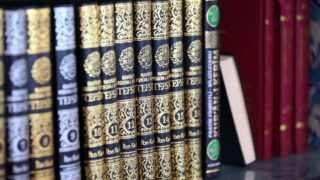The issue of celebrating the Prophet’s birth (Al-Mawlid An-Nabawi) is still a subject of great controversy among Muslims every Hijri year, between those who believe that celebrating and honoring the Prophet’s birth is an innovation in Islam and a deviation from the guidance of the faithful Prophet, and that the Prophet (peace and blessings of Allah be upon him), his esteemed companions and those who came after them. Those generations did not know this celebration, as a result it is one of the denounced acts, as stated in the hadith of Aisha – may Allah be pleased with her – “Whoever adds to this religion what is not in it, shall have their innovation denounced.”
Also the first celebration of the Prophet’s birth was created during the reign of the Fatimid Shia Ismaili dynasty, and that this did not come out of the womb of Ahl as-sunnah wal jamaa’ (Being upon the Sunnah and the way of the companions).
Among those who said that it is forbidden to celebrate the Prophet’s birth are the imams: Ibn Taymiyah, al-Shatibi, Taj al-Din al-Fakihani and others.
On the other hand, there are scholars of Ahl as-Sunna wal Jamaa who believe that the celebration of the Prophet’s birth is legitimate, which revolves between admiration and permissibility, and that it is a reminder of the most important event in the history of the Ummah, which is the birth of the Prophet (peace and blessings of Allah be upon him), and that it is generally part of the reminder Allah has commanded us to do generally from time to time, as the Almighty said: “And remind them of the days of Allah that there are verses for patient and thankful one” [Abraham: 5].
Among the most prominent jurists who said that it is permissible to celebrate the birth of the Prophet are the imams; al-Suyuti, Ibn Hajar al-Ashkalani, al-Sakhawi, Ibn Abdeen, Shams Din ibn al-Jazari, al-Nawawi and al-Qastalani among others.
For a proper clarification we explore the real meaning of celebration:
Between celebration and honoring
A differentiation must be made between celebration and honoring. honoring means paying respect and special regard. Such as the way people honor their countries with national day.
While celebration on the other hand is the establishment of a particular activity, where people gather to commemorate a particular occasion and exchange congratulations with certain practices and actions. Although these words can sometimes be used interchangeably.
Applying this analysis to the Prophet’s birthday, the celebration is well recognized in some Muslim countries, irrespective of all the irregularities and the practice of vices involved, such as mixing between men and woman, beating tambourines and some Sufi activities, such as mawlids anthems that contain illegitimate words, or contain exaggeration and clamor, and other things that were not known in religion until later times and by the foreigners. These acts are categorically forbidden in Islam.
However, as for honoring the Prophet’s birthday, this comes as a form of a reminder of the birth of the Prophet (peace and blessings of Allah be upon him) including the miracles and blessings that followed, and the reminder of the bestowment of Allah to the Muslims by sending Muhammad (peace and blessings of Allaah be upon him) as a messenger to them, as the Almighty said: “Allah has blessed the believers by sending them a messenger of their own who will recite his verses to them, praise them and teach them the book and wisdom, even if they were previously in a manifest delusion” [Al-Imran: 164] And he said, “He who sent among the illiterate people a messenger from them who would recite his verses to them, purifies them, and teach them the book and wisdom, even if they had previously been in a manifest delusion” [Friday: 2].
The birth of the Prophet (peace and blessings of Allaah be upon him) was also an acceptance to the prayer of Prophet Ibrahim (peace be upon him), as the Almighty said: “Our Lord, and send them a messenger from them who will recite your verses to them, teach them the book and wisdom, and recommend to them that you are the dear wise one” [Al-Baqarah: 129].
Example of honoring this day includes reminding people of the Prophet’s birth, during our period lessons, in mosques, or on radio and television programs. The Prophet’s birth can also be honored by reading the books of Prophet Muhammad’s biography and good qualities (As-Shamail Al Muhammadiyyah), and anything that would remind of the Prophet’s birth in a knowledgeable and preaching way.
In this regard we had got to acknowledge the type of difference that exists between celebration and honoring. Thus honoring the Prophet’s birth is permissible, while the celebration remains a matter of dispute among jurists.
The celebration of the Prophet’s birth and the Fatimids
Although the Fatimids celebrated the Prophet’s birth during their reign, which lasted from 362 AH to 567 AH, this was a desire to please the Egyptians, because they knew the Egyptians’ love for Islam, the religion and the Prophet, but there is a historical error that tracked the manifestations of celebrating the Prophet’s birth date to the Fatimid era.
It is historically established – as stated in the book (Social Life in the Fatimid Era by Dr. Abdul Moneim Abdul Hamid Sultan – Dar Thaqafah al-ilmiyya: 1999) that there is a difference between the Fatimids’ celebration of the Prophet’s birth and the celebration of Muslims in Egypt, he says:
“The celebration of the Prophet’s birth in the Fatimid-Ubaydiyyah’s state was limited to the production of sweets and its distribution, and the distribution of almsgiving, while the official celebration was always celebrated in the procession of the chief judge, where the trays of candy are carried, and everyone heads to the Al-Azhar Mosque, then to the Palace of the Caliph, where he gives a speech, then they prayed for the Caliph, after which everyone returns to their homes, while the celebrations that got more attentions were made for the Shia celebrations.”
Is Prophet’s birth celebration a religious or historical occasion?
One of the criteria that must be considered for the ruling on celebrating the Prophet’s birth is whether celebrating and honoring the Prophet’s birth is a religious holiday or a historical occasion? As it is known that the celebration and honoring of the Prophet’s birth came in the fourth century AH, but was not related to shariah ruling. As a result, it is not ruled with sanctity or obligation, rather it is a historical occasion which some Muslims marked to remember the birth of the Prophet (peace and blessings of Allah be upon him) and did not introduced it into sharia, guidance or morals discussion. It is more like celebrating the national holidays of countries.
The researcher Zouari Ahmed Ali concluded in his research: “The Ruling on Celebrating National Holidays: A Fundamental Study” that the Prophet’s birth celebration is permissible, and stated in the conclusion of the research:
“Our research concerns the ruling on the celebration of national holidays, which have become a custom in all countries and recognized nationally and internationally, and we have concluded in our study that they are permissible, and do not contradict the provisions of Islamic law; rather, one of the signs of their legitimacy is the different linguistic and sharia uses of the meaning of Eid. The Holy Quran made the celebration of such days that were attached to an historical event, to be a reminder of the days of Allah. This makes it part of customs, not worship, neither is it from the forbidden innovations. The Proof of permissibility is applicable here where there is a lack of evidence, even if the names are the same as long as the contents are different.”
The Permanent Committee for Scholarly Research and Ifta, Kingdom of Saudi Arabia, also went on to differentiate between types of celebration, and considered that the celebration of the Prophet’s birth and Mother’s Day is one of the innovations that were forbidden. However this same committee also sees nothing wrong if a week is dedicated for teaching and educating people. It stated in its fatwa:
“What was intended to organize works for example for the benefit of the nation and control its affairs such as the week of traffic, study days, meeting with employees to work and so on, which are not part worship. This would come under the category of normal innovations that are not included in his saying, may the blessings of Allah be upon him: “Whoever adds to our Deen, that which is not from it, such act shall be denounced” so there is nothing wrong with it, rather it is permissible.
I believe that the celebration of the Prophet’s birth is not about faith or worship, but is related to history, because it is part of the Prophet’s biography. And the events of the Prophet’s biography are part of history, therefore they are classified in biographies, genealogy and Islamic history.
The question about the Prophet’s celebration actually originated from the meaning of “Eid” and celebration. First, we must spot the difference between the terms celebration and honoring, then we differentiate between the type of celebration and the honoring and the activities that follow.
In addition, remembering the birth of the Prophet (peace and blessings of Allah be upon him) is an historical event that does not fall under the article of faith or worship. In fact, remembering the life of Prophet, his guidance and lessons derived therein should become a necessary habit today then ever for every Muslims, especially, in this age when the ummah is indirectly being swayed from the pristine form of religion, provided that the reminder of the Prophet’s birth is not accompanied by any evil acts or innovations.
A contrary to this is considered haram, because it involves unlawful acts, thus the celebration in this regard is haram due to the added unlawful act, not by its initial ruling, as the jurists say: “The ruling revolves with its cause; in existence and in non-existence.”


















